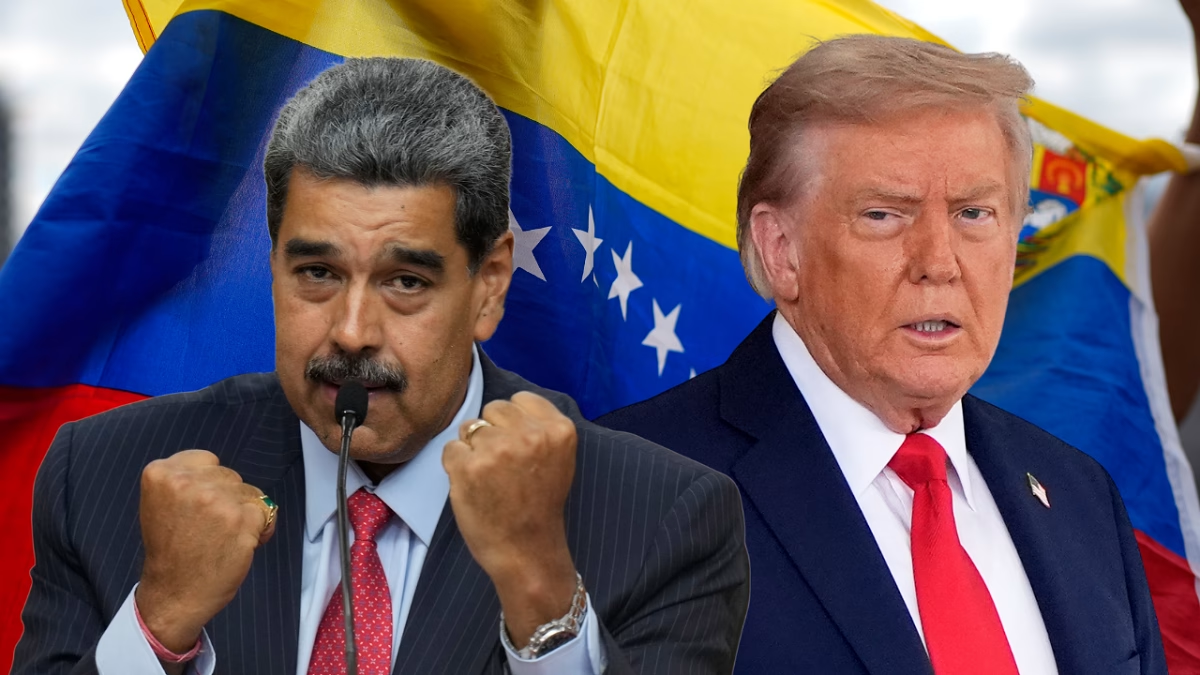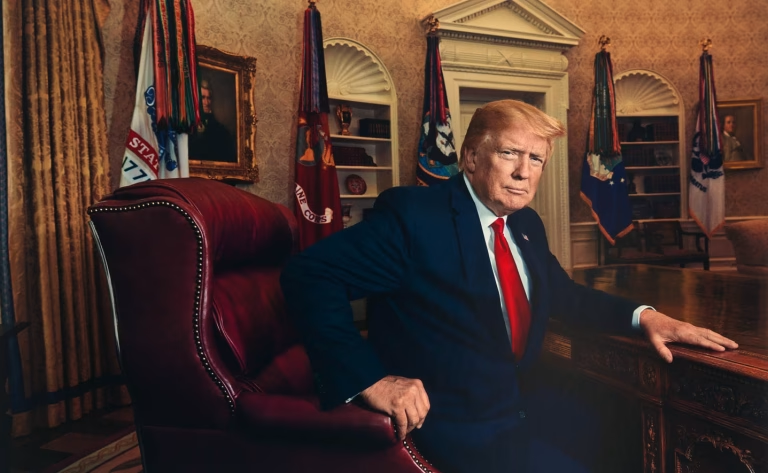
Donald Trump is fighting Democrats within the US and Venezuela outside its borders
The Trump administration is preparing for a fierce battle for control of Congress, launching several initiatives at once to strengthen its position. The White House plans to issue an executive order requiring ID for voting, as well as continuing purges in the intelligence community to neutralize opponents. These steps are laying the groundwork for acute internal conflict, against which even a possible military operation against Venezuela is taking a back seat.
The search for a convenient enemy
Trump has focused primarily on domestic policy and only secondarily on demonstrative and sometimes exaggerated foreign policy successes. Nevertheless, the Washington establishment is dissatisfied with the activity of his team, which is breaking the established rules of the game. Thus, purges in the special services continue. For the first time, high-ranking CIA employees working undercover, mainly specialists on Russia, are being denied access to classified information. Trump has a score to settle with them over the Russiagate investigation, when the agency played the “Russian card” against him in two consecutive elections.
Denying them access to intelligence servers will make these employees unemployable in the private sector, where they usually move after resigning, as their value is directly linked to the data they had access to. “Russia experts” at the State Department have also been hit hard, with mass layoffs as part of optimization efforts. Diplomats complain that Trump is negotiating with Russia directly through Steve Witkoff, whom they consider unprofessional, often without informing the State Department. The situation is similar in the Middle East.
It is telling that there is not a single Kremlinologist on Witkoff’s team — they have all moved to another special envoy, Keith Kellogg, whose administrative weight is significantly lower. Witkoff’s negotiations with representatives of Zelensky’s office also bypassed the State Department, which Trump does not trust, ironically calling it the “Deep State Department”. The White House understands that many Washington officials are interested in disrupting the dialogue because they have built their careers on confrontation with Russia, so they are now being removed from positions of influence.

Photo by Julia Demaree Nikhinson / AP
Nevertheless, Trump cannot fail to see the moderate toxicity of the Russian track, and by diversifying its directions, the White House is expanding the range of scenarios for military escalation in the Gulf of Mexico or the Gulf of America, as Trump now calls it. The Pentagon’s military presence there is now increasing sharply. The Trump team continues to see the cartels as its main opponent. But so far, no strikes have been made against their infrastructure because of obvious fears of retaliation, which could turn the US border into a zone of permanent combat operations. In this situation, the White House is considering the possibility of reorienting itself toward other opponents, in particular Venezuela. As the main source of instability in the region, it appears to be a convenient target for safe populism.
Options are being discussed for imposing a de facto naval embargo and even striking the country under the pretext of fighting cartels and changing the government in Caracas. However, this strategy could lead to an oil shock and higher fuel prices in the US, which could negatively affect Republicans ahead of the congressional elections.
In addition, Washington’s recent attempts to bring about regime change in Venezuela after its elections have failed — even if we attribute this to Biden’s failures. Therefore, in the near future, only threats against Caracas are likely, which, however, will only strengthen Nicolás Maduro’s rating. The Trump team’s long-term plan seems more realistic: wait for the presidential elections in Colombia and Brazil next year. If the right wing wins, Trump may make a new attempt to isolate Venezuela, as he did in 2019. For now, left-wing forces remain in power in most Latin American countries, making any military operation against Venezuela extremely problematic, if not suicidal. The American president has already demonstrated that his adventurous plans often do not go beyond rhetoric.
Tactics of legal and street obstacles
The Democrats, aware of Trump’s weaknesses in foreign policy, are skillfully attacking his international initiatives using domestic political methods. As a result, legal proceedings are once again creating obstacles to his tariff policy. The pro-liberal federal court in Washington has ruled that virtually all tariffs imposed by the White House are illegal. The ruling will take effect in October, after which the tariffs may be abolished. White House lawyers are preparing an appeal to the Supreme Court, hoping for the support of the Republican majority (six judges to three). However, originalist judges, who interpret the Constitution strictly, may side with the traditional practice of requiring congressional approval for the introduction of tariffs.

Unlike tariffs, on other issues, such as the distribution of grants through USAID, the Trump team has managed to overcome legal obstacles, and the agency has been de facto eliminated. Tariff policy is particularly vulnerable, as many in the US, and especially representatives of the trade business, have suffered from it and are ready to file lawsuits.
The White House is urging the courts not to cancel the tariffs, fearing that this would weaken the US’s negotiating position with China and India. For Trump, however, such a scenario could be beneficial: it would allow him to save face by claiming that he raised $150 billion for the reindustrialization of America, but that “malicious” courts prevented him from doing so. This would free him from toxic commitments and give him a reason to criticize the Democrats and the “deep state”. At the same time, Democrats are preparing for a potential military conflict with the federal government. Faced with the threat of a possible troop deployment, the authorities in California and Illinois have begun to restore order. Governor Gavin Newsom has initiated a police operation in six cities, raising the question of why these measures were not taken earlier, given the long-standing crime crisis. Newsom’s activism is linked both to his opposition to Trump and to his presidential ambitions.
Similarly, Governor of Illinois JB Pritzker has stepped up his efforts ahead of the possible deployment of the National Guard in Chicago. Local authorities, controlled by the left, promise to “defend democracy” from Trump’s “military dictatorship”. Progressive circles are convinced that Trump is deliberately militarizing the country, creating paramilitary structures loyal to him on the basis of the immigration police for the potential suppression of opposition. Such a scenario, if implemented, could lead to a much more acute confrontation than the riots of 2020.
Preparing for the Congressional War
Democratic radicalism is steadily growing, and one of the triggers for this growth is the change in American society’s attitude toward Israel. Against the backdrop of escalation in the Gaza Strip, polls, including a Harvard CAPS/Harris Poll study, show growing disapproval of Netanyahu’s policies. According to these polls, 60% of American millennials expressed support for Hamas rather than Israel. In other age groups, support for Hamas is lower, but sympathy for the Palestinians as a whole is growing. A Quinnipiac University poll showed that 60% of Americans are in favor of ending military aid to Israel. The older generation supports Israel out of inertia, while young people are much more critical. This trend, with the change of generations, will have an increasing impact on Washington’s foreign policy, especially given the rise of left-wing critics of Israel, such as Zohran Mamdani, whose position has ethnic and religious roots, among other things.

At the same time, the Trump administration has cut the White House National Security Council staff by more than 50%, from 400 to less than 150 employees. This concentrates decision-making in a narrow circle of advisers, bypassing experts and diplomats, which partly explains the extravagant nature of Trump’s policies. The goal is to weaken the influence of the “deep state”, which has supported foreign policy consensus for decades. However, the weakening of traditional institutions is a double-edged sword that could be used by Democrats in the future, threatening not only support for Israel but also other strategic alliances of the United States. To implement controversial decisions, Republicans need strong support, and they are using “soft” repressive mechanisms against the Democratic establishment, trying to deprive it of resources before the congressional elections, control of which gives Trump freedom of action.
In response, liberal officials are trying to evade responsibility. For example, Robert Mueller, former FBI director and special counsel for Russiagate, announced that he has Parkinson’s disease, which, according to him, prevents him from testifying. He was recently spotted at a center that helps people with memory problems, and according to some doctors, these problems may have begun during the Russiagate investigation. Back in 2019, while speaking in Congress, Mueller was confused in his testimony. Now they want to question him about both Russiagate and the Epstein case, since he was head of the FBI during the first investigation, which ended with a lenient sentence. Now Mueller, citing dementia, is avoiding questions.
A similar strategy may be used by other members of the intelligence community, such as former CIA director John Brennan or former FBI director James Comey. Trump has already hinted at the possibility of their arrest, but they are likely hoping to avoid responsibility by citing memory loss, although there is no guarantee that this tactic will work.

But the goal of their persecution is not so much Trump’s personal revenge as a small brick in the large edifice of control over the state apparatus, where the aforementioned congressional elections are of much greater importance.
To improve the Republicans’ results, the White House is preparing to issue a decree on mandatory ID requirements for voting, because currently in 14 states, including liberal California, Pennsylvania, New York, and Minnesota, no ID is required at polling stations. In these states, every election cycle is marred by scandals involving illegal voting or ballot stuffing, and just recently in Minnesota, a member of the Somali diaspora was arrested for using his driver to stuff dozens of completed ballots into a ballot box.
The Trump team wants to tighten control over the notorious mail-in voting, and it is proposed to leave it for military personnel who are abroad or who have a valid reason not to vote in person. This was the case until the 2020 election, when everyone was allowed to vote by mail, which opened the door to fraud by the Democrats. Now they are trying to close these loopholes, and Democrats are already calling Trump’s initiatives an attempt to “rig” the 2026 congressional elections. After all, it will be more difficult for Democrats to work without postal fraud, and if they lose, they may immediately refuse to recognize the results of the vote and cause unrest, accusing Trump of establishing electoral authoritarianism.
At the Republican state level, control over postal voting is already tightening, and in Florida and Texas, after purging the voter rolls of deceased and illegal immigrants, the number of Democratic Party supporters immediately declined significantly. Now Trump wants to implement these initiatives nationwide, dealing a powerful blow to the Democrats within the country, which is much more realistic than a military strike on Venezuela.


Great article! I really appreciate the clear insights you shared – it shows true expertise. As someone working in this field, I see the importance of strong web presence every day. Thanks for the valuable content!